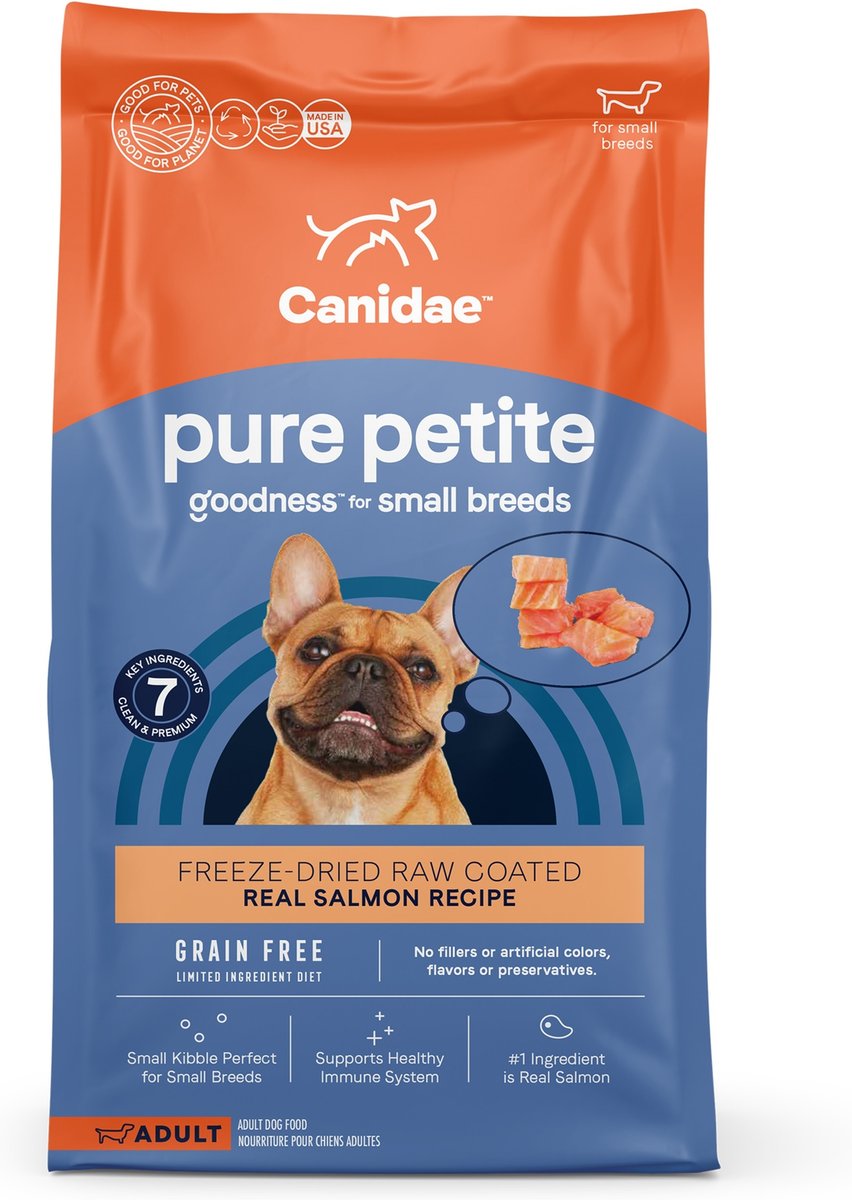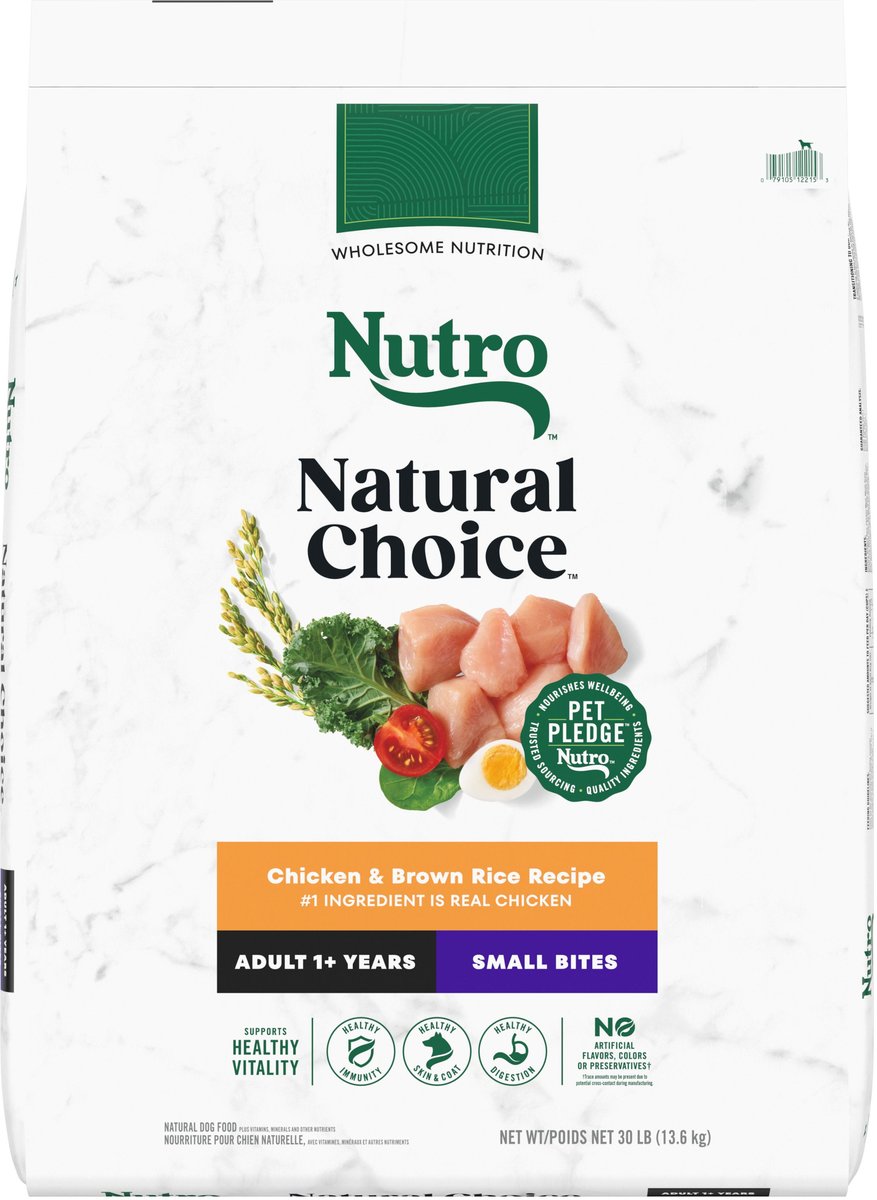What's the Best Dog Food for Yorkshire Terriers?

The lively Yorkshire Terrier is full of charm and spunk. A breed that enjoys excellent longevity, the right diet is important to helping this dog breed live life to the very fullest. Whether you share your home with a puppy, adult, or senior Yorkshire Terrier, it’s important to find the right food to support your dog’s health and wellness through each stage of its life.
Jump to section
Breed Info
Breed Group:Toy | AKC Yorkshire Terrier Profile
Ideal Weight:Female Adult: 5 to 7 pounds
Male Adult: 5 to 7 pounds
Exercise Need:30 to 50 minutes per day
Breed Summary
Yorkshire Terriers are a big dog in a small package. A breed that is deeply self-assured and confident, the Yorkie has a playful streak and loves to enjoy the active lifestyle with its beloved family. The Yorkshire Terrier traces its roots to Yorkshire, England where the breed was employed ridding the region of nuisance creatures such as rats and other rodents.
As one of the smallest breeds, the Yorkshire Terrier reaches a maximum adult weight of 6 pounds and has an average life expectancy of 12-15 years. The breed has energy to spare, and thus, requires regular daily exercise up to a maximum amount of 30 minutes. This will help the Yorkie to achieve and maintain a healthy weight, an important component of wellness in toy breeds.
The Yorkshire Terrier is an intelligent breed. A dog with a fierce streak of independence, Yorkies can be very stubborn and will often resist opportunities to learn new things.
A loving and devoted family companion, the Yorkshire Terrier thrives in its role as a lap dog. The breed can be highly vocal, loving the sound of it own voice. To keep happy relations with the neighbors, the Yorkie should be taught a no bark command.
Though the Yorkshire Terrier is an active breed, it is also small of size, meaning it is well suited to life in any living situation including apartment life so long as its exercise requirements are met.
Physical Traits
Sturdy, silky-haired, muscular, compact, active
Personality Traits
Spirited, lively, loving, energetic, stubborn
Health Considerations
-
Yorkshire terriers are generally a very healthy breed. However, as with all dog breeds, there are some health conditions the yorkshire terrier can be genetically predisposed to developing. Diet can be a great help in exacerbating symptoms or preventing injury or illness from occurring.
Among the most common health problems that can plague the Yorkshire Terrier are bronchitis, portosystemic shunt, and cataracts. -
Allergies
The Yorkshire Terriers is only one of many dog breeds that can be troubled by allergies. Food allergies are the most common culprit, and an elimination diet can help to pinpoint the food triggers. Some dogs also suffer from sensitivities to things in the environment or topical treatments such as creams, shampoos, and conditioners. Every dog is a little different, so just keep an eye out for sneezing, wheezing, coughing, red or watery eyes, or rashes. Even the healthiest diet may need to be adjusted if your shih tzu has allergies.
-
Bronchitis
Bronchitis is a condition that can be acute or chronic in the yorkshire terrier. It occurs when the airways are negatively impacted by swelling. This inflammation can spread into the lungs as well. To prevent bronchitis in your Yorkshire Terrier, make sure to keep him or her at a healthy weight and reduce exposure to inhaled irritants that may have allergic effects. Vaccinating against bordatella bronchiseptica is important, too.
-
Eye Health
Yorkshire Terriers do have susceptibility to eye issues, as do many dogs. Cataracts, particularly, are common in Yorkshire Terriers. While cataracts typically can't be prevented, overall eye health can be aided by diets with certain ingredients, like these below:
Recommendations:
Anthocyanins・ Astaxanthin・ Beta-carotene・ Carotenoids・ Glutathione・ Lutein・ Lycopene・ Omega-3 essential fatty acids・ Phytonutrients・ Vitamin A・ Vitamin C -
Hip Dysplasia
Hip dysplasia is a condition in which the hip bone does not fit properly in the socket joint. Over time, the rubbing of bone against bone causes deterioration of the bones, leading to pain, lameness, and even early onset arthritis. Hip and elbow dysplasia aren’t something you can really prevent with nutrition, but you can help mitigate discomfort with foods that contain joint-healthy ingredients.
Recommendations:
Antioxidants・ Chondroitin・ Glucosamine・ Green Mussel・ Methylsulfonymethane・ Omega-3 from Fish Oil・ Taurine・ Turmeric・ Vitamin E -
Portosystemic Shunt
A problem that can be common to Yorkshire Terriers, portosystemic shunt is evidenced by a blood vessel that functions abnormally by causing blood to move from the intestines without first moving through the liver for proper filtration of toxins. A diet with high-quality, hiigh-digestible proteins to support optimal health in the Yorkshire Terriers terrier can be helpful.
Get a tailored nutrition profile for your dog
Our free nutritional assessment tool provides individualized recommendations based on your dog's breed characteristics, age, weight, body condition score, and activity level. It only takes 30 seconds to receive science-based insights to support your dog's lifelong health.
Are Fresh Food Diets Good for Yorkshire Terriers?
Only if they’re properly balanced.
Many well-intentioned Yorkshire Terriers parents spend a lot of time preparing meals at home, but health benefits are lost if meals aren’t properly portioned and balanced with all the nutrients dogs need. Recently, a few companies have done an excellent job ensuring accurate portions and nutrient balance by delivering pre-prepped fresh meals customized to the size and needs of your dog. Farmer’s Dog, Ollie and Nom Nom have each been approved by our nutrition team as delivering truly quality and well-balanced meals. They can be a little expensive (usually 3-4x more per day than kibble), but many find the added health benefits worth the cost. They do offer discounts to new customers, though, if you’d like to try one out.
Pros and Cons of Fresh Food Diets
✓ Diets balanced by Nutritionists・ ✓ Customized portions for weight control・ ✓ Superior digestive and immune health ・✕ More expensive than standard dog food
Foods We Recommend for Yorkshire Terriers Puppies
How long do Yorkshire Terrierss need puppy food?
Until they're 7 to 10 months old.
Yorkshire Terriers are very focused on growing, and how we feed them should help them do just that. Since they have so much growing to do, they need higher amounts of nutrients than adult dogs, especially proteins, fats, carbohydrates, vitamins, minerals and — don’t forget — water. It’s still important to not overfeed puppies, so make sure to portion food and keep treats to no more than 10% of their caloric intake. Since balance is so important, we recommend that your young Yorkshire Terriers is eating food that is made just for puppies from a reputable brand.
Find the best nutritional start for your puppy
Our recommendation tool evaluates your puppy’s breed, age, growth stage, lifestyle, and health needs to identify a scientifically appropriate diet from over 10,000 options. Obtain personalized guidance to help support healthy development and lifelong wellness.
Foods We Recommend for Yorkshire Terriers Adults
When should Yorkshire Terriers start transitioning to adult food?
When they're 7 to 10 months old
From a nutrition standpoint, Yorkshire Terriers become adults once they reach about 90% of their expected weight. Once adults, our two key nutrition goals are balance and maintenance. We want balance because a dog’s body is responsible for a lot of things, like digestion, fighting infection, keeping muscles strong, and chasing squirrels. These are all important tasks, so we want to make sure each body function gets its share of nutrients. We also need to maintain a healthy weight. Underfed dogs are at risk for malnourishment, and overfed dogs can become obese — both of which lead to even worse problems for a Yorkshire Terrier
Find the optimal nutrition plan for your adult dog
Our assessment analyzes your dog’s breed, age, lifestyle, and health considerations to recommend a scientifically selected diet from over 10,000 options. Personalized insights to help your dog thrive through adulthood.
Foods We Recommend for Yorkshire Terriers Seniors
When should Yorkshire Terriers start transitioning to senior food?
All dogs can age differently, but toy dogs like Yorkshire Terriers can start to benefit from senior food around 10 to 12 years old
Ever watch kids running around the playground and wish you had that energy again? Yeah. Dogs get there, too. The metabolic processes in senior Yorkshire Terriers slow down as they age, which often means they aren’t needing quite as many calories as they did in their prime. Smart dog food companies have formulated senior diets to ease up on calories but still help them feel full and give them adequate maintenance protein. Still, like humans, everybody is different. Sometimes older dogs need just as many calories, or more, depending on how their bodies progress. So keep a close eye on their body condition, and look for dog foods made for seniors.
Support your senior dog's health with targeted nutrition
Our assessment analyzes your dog’s breed, age, and health considerations to recommend a science-based diet from over 10,000 options. Help maintain mobility, cognitive health, and quality of life.
Affiliate Disclosure:
We do not accept money to recommend pet foods. However, we do receive referral fees from online retailers (such as Chewy or Amazon) on qualifying purchases. Our recommendations are neutral, and diet recommendations are made without considering whether we will receive a referral fee.















